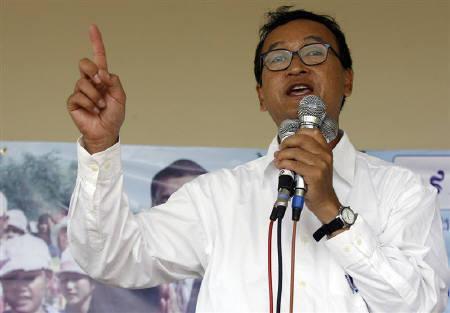
Cambodian leader Sam Rainsy. Source: Reuters
While the North African revolutions of the past year and a half swept away several long-serving dictators, sadly rulers with an ironclad hold on power remain in various parts of the world. In Cambodia, Prime Minister Hun Sen has ruled the country since 1985 and shows no signs of relinquishing power. He is the longest-serving head of government in all of Asia. But an opposition movement is growing, inspired by the example of the Arab Spring. But can demand for democracy and fair governance lead to revolution in Cambodia? In other words, can the Arab Spring model work in other places?
Granted, Cambodia has come remarkably far from the Khmer Rouge’s horrific authoritarian rule and genocide in the 1970s. Under Hun Sen–a former Khmer soldier who defected to Vietnam during the reign of terror–Cambodia has experienced sustained economic growth, institutional stability (see below for discussion of the dubious methods used to get this), a reduction in poverty, and growing acceptance by the international community.
Yet one term not associated with present-day Cambodia is democracy. As put by journalist Thomas Mann Miller, Hun Sen has been “shrewd and relentless in eliminating his political foes,” established “a pervasive patronage system,” has the media in his pocket, and deftly played regional and global powers against each other to his advantage. Hun Sen has also been described as a “tough-talking strongman…[and] a ruthless leader who has intimidated his opponents into submission or frightened them out of the country.”
The Cambodian government is seen as highly corrupt. In international monitoring group Transparency International‘s 2011 Corruption Perceptions Index, Cambodia ranks 164th out of 183 countries in terms of public sector honesty (meaning it is considered highly corrupt). In local elections held last week, Hun Sen’s party won an overwhelming number of contests in elections considered almost assuredly fraudulent. “The ruling party has used state property and civil servants to help campaign for the sake of its own party interests,” according to Koul Panha, executive director of election monitoring group Comfrel. There have also been widespread reports of vote buying and intimidation to secure support. While 10 parties appeared on the ballot, none come close to having the resources of the ruling party. These results are seen as confirming Hun Sen’s security in parliamentary elections to be held next year.
A popular uprising, and installation of democracy, seem unlikely in this environment. But no one could have predicted revolutions in Egypt and Libya either. “The Arab Spring has shown that democratic reformers can triumph even under the most improbable of circumstances,” says Miller. Plus movement toward democracy and openness in Myanmar–long a bastion of authoritarianism–makes Cambodia’s deficiencies look that much worse.
Recently there have been signs of rising discontent with government policies (according to Miller’s article). Foreign, private companies have taken ownership of large land holdings, often through tainted bidding processes. The owners are represented by local managers who often act as fronts for corrupt politicians. Local farmers–Cambodia’s economy remains comprised primarily of subsistence farming–have been either cheated out of their rightful earnings or evicted from their land. And if this isn’t bad enough, thus far in 2012 government police forces have fired upon crowds protesting these evictions, unsafe factory conditions, and illegal logging practices.
Sam Rainsy, leader of Cambodia’s opposition, is trying to capitalize on the current air of revolution: he’s calling for the overthrow of Hun Sen’s regime. But the opposition faces a tremendous uphill battle. Hun Sen is firmly entrenched in power, and controls virtually all aspects of Cambodian society. It will be challenging to convince people to oppose such a force. Plus Rainsy is in exile, and faces arrest if he returns to Cambodia (he claims the charges are bogus, intended to prevent him from running for office).
A full-scale revolt in Cambodia is likely to end badly. The current government has too much control. Perhaps Myanmar offers a better model for the opposition: try to insinuate yourself into the regime and change it from within. Now this will not be an easy path either- significant reforms would need to happen (and Rainsy granted some kind of clemency). The chances of the government capitulating are slim.
But that doesn’t mean it is not worth the effort. If Rainsy can gather enough committed citizens to his cause, you never know. If the Arab Spring taught us anything, it’s that political change is possible in the most unlikeliest of places.